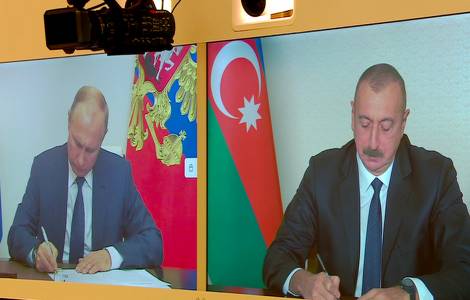
Stepanakert (Agenzia Fides) - "When weapons are silent there is always hope. But for many Armenians, the ceasefire agreement represents only a surrender. Evidently, there was currently no other viable solution for the Armenian government", comments Boutros Marayati, Armenian Catholic Archbishop of Aleppo, on the news of the ceasefire of the Nagorno-Karabakh region signed in the late evening of Monday 9 November by the political leaders of Armenia and Azerbaijan, with the mediation of Russian President Vladimir Putin. "At the moment" said Archbishop Marayati "the details of the agreement are not yet known, and only general assessments can be made in this regard. There remains the pain for the many young people who have died in recent weeks, and the hope that Nagorno Karabakh remains a land where Armenians can continue to attend their churches and maintain their traditions".
Armenian Prime Minister Nikol Pashinyan was the first to announce on Facebook that he had signed an agreement with the presidents of Azerbaijan and Russia to end the Nagorno-Karabakh war, which he himself described as "painful". His statement came a few hours after confirming that the key city of Shushi had already been captured by the Azerbaijani army while the armed forces were advancing to Stepanakert, the capital of the disputed region.
The agreement ends a six-week conflict with violent tensions in which hundreds of people have died. The Armenian Prime Minister Nikol Pashinyan declared in his statement that the agreement was "the best possible solution for the current situation".
Azerbaijani President Ilham Aliyev, in a televised speech, described the agreement as a "surrender" of Armenia. "We forced him to sign this document", said Aliyev, referring to Armenian Prime Minister Nikol Pashinyan. "This is basically a surrender". The Azerbaijani President added that the agreement provides for Russian troops to be stationed in Nagorno-Karabakh for the next five years. "Today's statement" added Putin, "shows that Russia and Turkey have a joint peacekeeping mission. We are creating a completely new format for relations in the region".
Russian President Vladimir Putin confirmed the agreement on the Nagorno-Karabakh ceasefire in a speech broadcast by Russian TV broadcaster Rossiya 24 TV, adding that Azerbaijan and Armenia will keep their positions under their control, and awaiting the deployment of Russian peacekeepers along the front line and along the corridor connecting Karabakh with Armenia. Displaced people and internally displaced persons will return to their areas of origin under the control of the United Nations High Commissioner for Refugees".
Protests broke out in Armenia after the news of the ceasefire agreement became known. The protesters besieged the parliament and had clashes with the bodyguards of the parliamentary speaker Ararat Mirzoyan, who defined the protesters as mercenaries manipulated by "the criminals of the former government" who in the past "robbed the people, the army and our children". Iveta Tonoyan, leader of the opposition Prospera Armenia Party, expressed support for the street protests, and called on Prime Minister Pashenyan to resign. She described the signing of the agreement as "the most embarrassing chapter in our history". According to the terms of the agreement, Armenian troops are expected to withdraw from the occupied territories at the time of the ceasefire by early December. (GV) (Agenzia Fides, 10/11/2020)